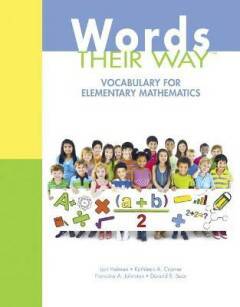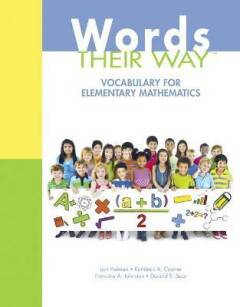
- Afhalen na 1 uur in een winkel met voorraad
- Gratis thuislevering in België vanaf € 30
- Ruim aanbod met 7 miljoen producten
- Afhalen na 1 uur in een winkel met voorraad
- Gratis thuislevering in België vanaf € 30
- Ruim aanbod met 7 miljoen producten
Zoeken
Words Their Way
Vocabulary for Elementary Mathematics
Lori Helman, Kathleen Cramer, Francine Johnston, Donald Bear
€ 47,45
+ 94 punten
Omschrijving
This practical guide gives mathematics teachers vocabulary-rich activities and strategies that target the important content objectives they already teach, and reflect the expectations of their state or the Common Core standards. The book's 12 hands-on teaching units address three areas of study covered in a typical mathematics class or textbook-geometry, measurement, and numbers and operations-and cover such topics as lines, angles, and polygons; properties of quadrilaterals; measurement area, perimeter, and volume and fractions. Each unit provides specific directions, language, reproducible materials, supporting activities, and assessments to help teachers effectively and efficiently target the different types of vocabulary needed for academic success-domain-specific and general academic vocabulary and language-all centered on the content that teachers already teach. Aimed at fourth and fifth grade teachers, but also useful to others who teach units on geometry, measurement, or fractions, Words Their Way: Vocabulary for Elementary Mathematics does not seek to replace the classroom mathematics text, but instead serves to explicitly support the learning of academic vocabulary so that students will do better when they work in their basal or other materials.
Specificaties
Betrokkenen
- Auteur(s):
- Uitgeverij:
Inhoud
- Aantal bladzijden:
- 192
- Taal:
- Engels
- Reeks:
Eigenschappen
- Productcode (EAN):
- 9780133376074
- Verschijningsdatum:
- 3/08/2016
- Uitvoering:
- Paperback
- Formaat:
- Trade paperback (VS)
- Afmetingen:
- 213 mm x 272 mm
- Gewicht:
- 317 g

Alleen bij Standaard Boekhandel
+ 94 punten op je klantenkaart van Standaard Boekhandel
Beoordelingen
We publiceren alleen reviews die voldoen aan de voorwaarden voor reviews. Bekijk onze voorwaarden voor reviews.











